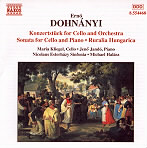Few composers have succeeded as well as Ernö Dohnányi in sounding both like a spiritual son of Brahms and a little cousin of Richard Strauss, combining the lush outfit of the latter with the conservative idiom of the former. His Konzertstück for cello and orchestra pays a huge tribute to Strauss, while the Sonata for cello and piano easily could be mistaken for Brahms No. 3 in the same genre. This is enjoyable, if highly predictable music. Only the Ruralia Hungarica stands out as an expressive and personal evocation of the composer’s native land. Maria Kliegel’s aplomb and deep sonorities never emphasize Dohnanyi’s shortcuts and lack of originality, but on the contrary they help the music find a distinctive tone. Jenö Jandó’s powerful piano playing is the ideal partner to her solid, straightforward performances. The same quality of well-balanced partnership is at work with the Nicolaus Esterházy Sinfonia under Michael Halász. Naxos’ engineers provide a rather confused sound for the Konzertstück, while, thanks to closer miking, the chamber music selections are more focused. If you like well-crafted, post-romantic music, give it a try.
































